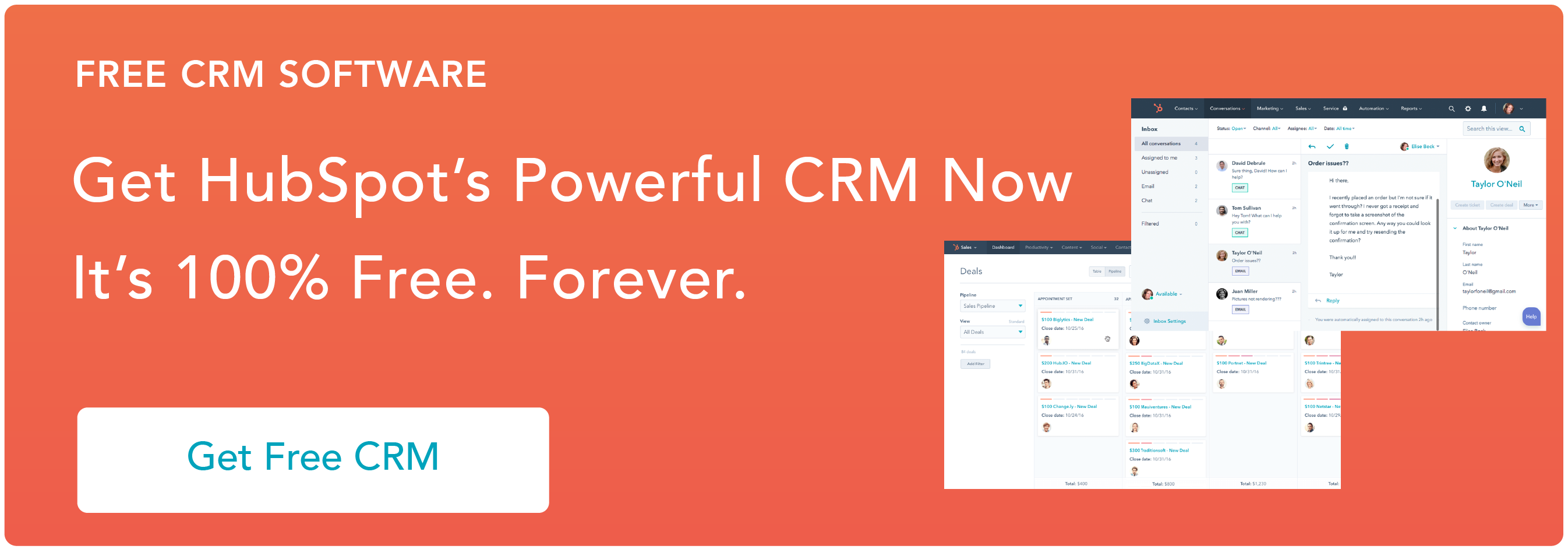You’ve seen article after article telling you why you should implement a CRM, but the last thing you need right now is another piece of software to learn.
CRM — or customer relationship management — refers to software that tracks interactions with prospects and customers. But do you actually need to be using a CRM, if you’ve been getting by without one?
Ultimately, the choice is yours. If you’re on the fence, here are the reasons why you don’t need a CRM.
Why You Don’t Need a CRM
1. You don’t want your contact data kept in one central location.
Image Source: Giphy
You might be asking yourself, "Can’t I just manage all of my customer data in an Excel spreadsheet and call it a day?"
Yes, you certainly can.
If you enjoy spending your precious time hunting through spreadsheets, emails, and paper trails to find all of your customer data, you definitely don’t need a CRM.
A CRM provides a full, accurate record of a rep’s entire interaction history with a prospect that’s accessible with one click. Using a CRM would give your team a central location to access pertinent customer data to make smarter, more informed sales decisions.
2. You don’t want every interaction with a customer to be logged automatically.
Image Source: Giphy
I’m sure your customers love answering the same questions repeatedly throughout the sales process, just as much as you love digging through your handwritten notes from each call trying to remember what the heck you talked about last time.
Having accurate, detailed records of each customer interaction that anyone on your team can reference and use to drive sales is a known side effect of using a CRM.
3. You don’t want communication across your organization to improve.
Image Source: Giphy
In addition to making life easier for individual reps, CRM systems also improve communication at the organizational level — and who wants that?
Without having a CRM on hand to provide detailed records, reps can blindly take over each other’s territories as they work out of the same indecipherable spreadsheets with inconsistent data management.
By not using a CRM, reps can’t immediately assess what’s already been done with a given prospect or see what’s next. When activity recording is inconsistent, passing a lead from one rep to another becomes more challenging, and causes leads to leak through your funnel.
Your reps will need to piece together the interaction history of their prospects, which is a great use of their time as opposed to, you know, selling.
4. You don’t want to improve synergy with your marketing organization.
Image Source: Giphy
Isn’t having a major disconnect with your marketing organization the best?
Instead of knowing how marketing has engaged with leads before you hop on a sales call, continue working without a CRM, not having any background information about who the lead is or why they are interested in your product.
5. You aren’t interested in growing your business.
Image Source: Giphy
If making more money serving more customers isn’t of interest to you, definitely hold off on using a CRM. With one or two or five customers, manually tracking every interaction is doable. To keep business small, by all means, continue manually tracking.
Since you don’t want to triple or quadruple revenue in the years ahead, having your salespeople spend all their time recording prospect and customer information is no big deal.
Using a CRM, on the other hand, would empower you to analyze your salespeople’s activities to discover what outreach strategies or series of touchpoints work the best, helping your team close more deals overall.
6. You don’t want to save time by automating your business processes.
Image Source: Giphy
You’re working out of multiple systems to keep in touch with leads — email, live chat, phone — and spend a great deal of time moving from one system to another and manually recording notes from each touchpoint.
If you enjoy spending your time working in various systems and don’t want any of those systems to work with one another, definitely don’t get a CRM.
A CRM offers integration touchpoints that allow the various systems you work with to communicate with one another, offering easy hands-off automation for your key business processes.
7. You don’t want to serve your customers better.
Image Source: Giphy
Using a CRM would give you access to valuable customer trends and information, which you just aren’t interested in.
Having access to detailed customer information could help reps understand previous interactions customers have had with your company, helping them be more prepared for their calls and pitches.
8. You enjoy struggling to keep up with lead flow.
Image Source: Giphy
Business is booming, and you have more leads than you know what to do with. By not using a CRM, you can keep a steady stream of leads falling through the cracks because reps don’t have the bandwidth, data, or tools they need to follow up with them in a timely manner.
On the other hand, a CRM can capture your leads and help reps prioritize them so they can reach out at the right point of the sales process, improving their chances of making the sale.
9. You enjoy manual reporting.
Image Source: Giphy
Pouring over manual reports each week that are harder to pull than a tooth is by far your favorite part of the week.
If you were using a CRM, you could go to your dashboard and pull the reports you need with greater accuracy and consistency at the click of a button. But again, who wants that?
10. You’d be using a product that’s completely free, forever.
Image Source: Giphy
Think a piece of software this powerful has to cost a fortune? Think again.
The free HubSpot CRM offers time-saving tools that will benefit your entire team. HubSpot CRM is easy to use and gives you full visibility of your sales pipeline with up-to-the-minute data. In addition to contact management, you can enjoy features such as meeting scheduling, email templates, live chat, and more on an interface that’s free, forever.
There you have it, 10 reasons why you don’t need a CRM for your organization. Ultimately, there’s a very simple question you should ask yourself if you’re considering a CRM: Do you want to grow your business?
Your ability to do so is dependent on contacting your prospects at the right intervals and providing them relevant information at the right time, and you simply can't do this effectively without a CRM.
Ready to flip the switch? Check out HubSpot's free CRM today.







![The Importance of a CRM: Why Your Company Needs a CRM to Grow Better [New Data]](https://www.hubspot.com/hubfs/1-Feb-23-2021-12-59-16-65-AM.jpg)



